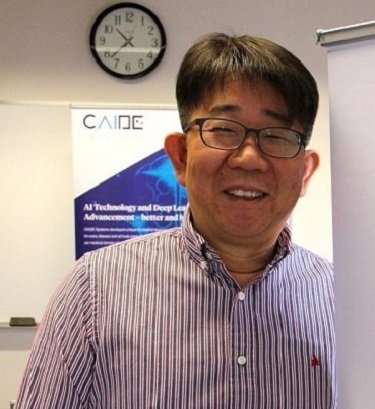Revolutionizing AI in Healthcare
Despite the upheaval that AI has created in the healthcare space, the lack of well-annotated data has been the biggest challenge in the development of disease detection AI engines. It slows the process and is very expensive. Moreover, annotation and labeling demand a heavy workload from medical doctors in the development stage of medical AI engines. Applying his extensive experience in objective recognition for medical image-based diagnosis using AI deep learning, Jacob Lee found the perfect solution to reduce the burden from this data annotation and labeling process.
“Generating a revolutionary unsupervised learning idea and implementing an advanced annotation system, our deep learning packaged platform, m: Studio gets rid of the cumbersome labeling process,” says Lee, Founder and CEO of CAIDE Systems. Hence, the medical doctors’ intervention is not necessary during these processes as CAIDE’s advanced annotation enables consistent and reliable outlining of the abnormalities in the medical images. Apart from data annotation, they also specialize in smart data augmentation method to solve data scarcity issue to enable the explosive bulk development. “We expect that in the clinical field, AI disease detection engines and the platform will automate the various workflows for diagnosis processes. Therefore, it will significantly reduce the errors due to tired eyes.”
CAIDE was established with a belief that everyone should equally be able to access to medical services, regardless of their social and financial status. They aim to resolve the errors and delays that medical imaging diagnosis process is prone to. “Radiologists or the hospital look for the package with the capability to assist the multiple diseases with high accuracy. Medical imaging equipment manufacturers also follow the trend and focus on answering the needs by providing a platform and multi diseases segmentation and classification functions,” notes Lee. Therefore, CAIDE builds capabilities to meet the customer needs in real time.
In the AI healthcare, CAIDE establishes its first application AI model, Brain Stroke Detection—plugged in m: Studio—which has capability to cover detection of both hemorrhages and ischemic strokes; can detect the location, volume and stroke types in different color. It was originally made for emergency room cases. “Stroke is one of the top causes of death in an emergency room situation and fast and correct reaction to this is very important. Our intent is to save 20-40 minutes of image review time and to reduce human errors after taking the CT image at the emergency center,” says Lee. “For someone, 1-minute means life or death. Our disease-specific AI engine carries this important role and m: Studio is the hub where the engines can provide inference results with detected abnormality within the images to radiologists and care providers.” Currently, CAIDE is in the middle of progressing in the KFDA approval process with Brain Stroke Detection in the South Korean market.
Also, the company’s machine learning scientists are leading the technical advancement from a specific disease-focused solution development to superior platform tools. Soon, they intend to develop tens and hundreds of disease detection AI engines through their platform technology. Unique technology sets, such as solution to annotation challenges and data generation, will be advanced, along with new and innovative approaches. According to Lee, they are looking for a strategic partnership with the imaging equipment manufacturers. “We are also actively working with individual research centers to offer more disease-specific applications to customers, ensuring the goal of providing a large number of disease detection engines.”

Company: CAIDE Systems
Website: www.caidesystems.com
Management: Jacob Lee, CEO
Founded Year: 2016
Headquarters: Lowell, Massachusetts
Description: Providing an artificial intelligence (AI) diagnosis platform, CAIDE Systems hopes everyone can benefit from the equal access to medical services.




